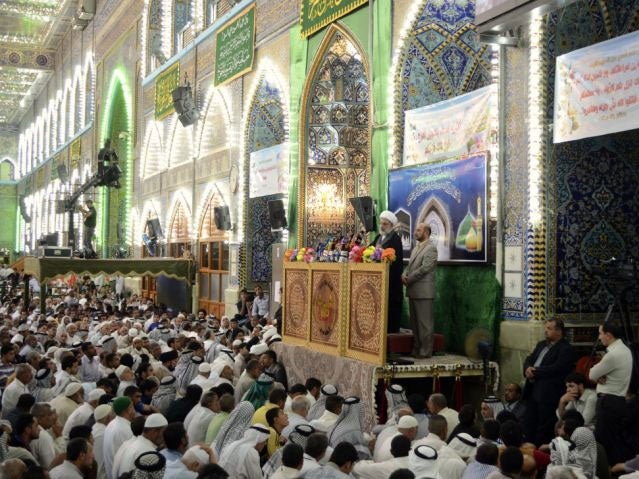Iraq crisis: What is the difference between Sunni and Shia Muslims, and why do they disagree?
The difference stems from who should succeed the Prophet Muhammad

Your support helps us to tell the story
From reproductive rights to climate change to Big Tech, The Independent is on the ground when the story is developing. Whether it's investigating the financials of Elon Musk's pro-Trump PAC or producing our latest documentary, 'The A Word', which shines a light on the American women fighting for reproductive rights, we know how important it is to parse out the facts from the messaging.
At such a critical moment in US history, we need reporters on the ground. Your donation allows us to keep sending journalists to speak to both sides of the story.
The Independent is trusted by Americans across the entire political spectrum. And unlike many other quality news outlets, we choose not to lock Americans out of our reporting and analysis with paywalls. We believe quality journalism should be available to everyone, paid for by those who can afford it.
Your support makes all the difference.The Sunni-Shiite split is rooted in the question of who should succeed the Prophet Muhammad in leading Muslims after his death in 632.
Shiites say the prophet's cousin and son-in-law, Ali, was his rightful successor but he was cheated when authority went to those the Sunnis call the four “Rightfully Guided Caliphs” — Abu Bakr, Omar, Othman and, finally, Ali.
Sunnis are the majority across the Islamic world. In the Middle East, Shiites have strong majorities in Iran, Iraq and Bahrain, with significant communities in Lebanon, Yemen, Syria, Saudi Arabia, Kuwait and other parts of the Gulf.
Both consider the Quran the word of God. But theology and religious practice distinguish between the two sects.
Some differences are minor: Shiites pray with their hands by their sides, Sunnis with their hands crossed at their chest or stomach.
Others are significant. Shiites, for example, believe Ali and a string of his descendants, the Imams, had not only rightful political authority after Muhammad but also held a special religious wisdom. Most Shiites believe there were 12 Imams — many of them “martyred” by Sunnis — and the 12th vanished, to one day return and restore justice.
Sunnis accuse the Shiites of elevating Ali to the level of Muhammad himself — incorrectly, since Shiites agree that Muhammad was the last of the prophets, a central tenet of Islam.
The bitter disputes of early Islam still resonate. Even secular-minded Shiite parents would never name their child after the resented Abu Bakr, Omar or Othman — or Aisha, a wife of Muhammad who helped raise a revolt against Ali during his Caliphate.
When outgoing Iranian President Mahmoud Ahmadinejad visited Egypt last year, the sheik of Al-Azhar, the bastion of Sunni theology, told him sharply that if the sects are to get along, Shiites must stop “insulting” the “companions of the prophet.”
Still, only the most hard-core translate those differences into hatred. But events in Iraq over the past decade show how politics can cause long-simmering tensions to spike.
The U.S.-led invasion that toppled Saddam Hussein's Sunni-dominated regime in 2003 propelled long-oppressed majority Shiites to power. Sunnis feared the repression would flip onto them. The result was vicious sectarian fighting that lasted until 2008: Sunni insurgents pulled Shiite pilgrims from buses and gunned them down; Shiite militiamen kidnapped Sunnis, dumping their tortured bodies on the streets and in rivers.
The bloodshed ebbed after the so-called U.S. surge, a revolt by moderate Sunnis against al-Qaida in Iraq and a Shiite militia cease-fire. But violence has again increased as minority Sunnis feel disenfranchised by the Shiite-led government and Sunni extremists have been emboldened by the successes of Islamic militants in the civil war next door in Syria.
Join our commenting forum
Join thought-provoking conversations, follow other Independent readers and see their replies
Comments